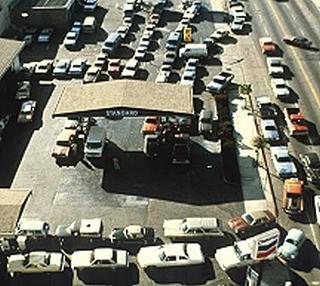
Before I moved to Boston, my blog topics were usually inspired by what I read or heard from a media source, but here in Boston, all I have to do is talk to people.
If I were to invent the perfect scenario to highlight economic illiteracy I guess it would be the higher gasoline prices caused by Hurricane Katrina. Really, I don’t think anyone could concoct a better catalyst. Idiot after idiot, moron after moron, have all raised their voices to hypothesize, blame, and display their immense collective ignorance.
A guy just asked me, “So who is ripping us off??????”
Apparently, “cheap” gasoline became an entitlement. I must have missed that in the
Boston Globe.
Furthermore, why does he assume that someone is ripping him off?
He assumes it because that is the foundation of the anti-business culture of Massachusetts. You will never find an article in the
Boston Globe extolling anything about a business – in fact it is laced with the complete opposite. Corporations are “laying people off….”, “
Bank of America is evil…”, “they are doing if for PROFITS…”, etc. And since the newspaper represents about 95% of New Englanders’ information base, you have a recipe for economic illiteracy.
Unfortunately, it is not as simple as “a socialist local media causes all of this anti-business sentiment”. New England is geriatric central – most of the people here are retired and/or on a ventilator. I am serious. When we were looking for a place to live up here, we walked by octogenarians in wheelchairs and with breathing tubes in the some of the building lobbies (in Brookline).
What do most old people do every day? Usually the same thing they did yesterday. It would be an understatement to call them creatures of habit. Their daily rituals border on the robotic. Breakfast at 4am, lunch at 10am, and dinner at 3pm. Daily lottery tickets, bingo, church on Sundays, maybe a weekly golf or bowling league,….
A huge part of this routine would no doubt involve the daily newspaper. For many people (mostly older), this is their major, if not only source of information. I hear too many people regurgitating the propaganda of their daily paper as if it were the unadulterated truth. Sure some people claim that they skip the editorials and think for themselves. The problem with that is that it does nothing to counter the journalistic sins of omission. There is and has been so much going on that simply does not get reported by the Mainstream Media. I don't care how many papers someone reads, or which ones for that matter - if they are not supplementing that info with alternative media (primarily on the internet), they will remain ignorant.
Sidebar: Why do the people that otherwise embrace alternative energy, alternative food (vegan, organic, microbrews, etc.), alternative music, and alternative lifestyles, do they consistently indict and shun alternative media?
Back to economic illiteracy. The economy of yesteryear, say 1930-1990, was a completely different animal than today's. Most older people had fewer than 3 jobs, if that, in their entire careers - with many having only had one job in their entire life. These jobs provided security until and after (defined benefit pensions) retirement. But today is much different. Industries come and go, jobs move and change, and marketable skill sets are constantly evolving. Young people today may have had 3-4 different jobs by age thirty. For the most part, young people today view a job as an opportunity to get rich whereas their parents viewed their jobs as stable entitlements. Older folk still bear the scars of the robber baron era and the labor/management wars of decades ago. My parents' generation would take their workplace complaints to their union rep or maybe just suck it up for years. Today, kids quit and find new jobs, go back to school, or maybe start their own business.
The older folk just don't understand economics - they think that "jobs" just appear out of thin air. Remember my
prior post on how William Galvin was meddling in the Procter-Gamble/Gillette merger? Well the Gillette CEO is fed up and warned the Boston establishment to STFU. Notice the self-righteous newspaper headline,
 Whiny Kilts puts Boston on notice: Gillette head slams Hub, warns critics."Procter & Gamble is looking at Massachusetts right now," he warned. "They're trying to decide if Massachusetts is a place where they want to expand and invest."
Whiny Kilts puts Boston on notice: Gillette head slams Hub, warns critics."Procter & Gamble is looking at Massachusetts right now," he warned. "They're trying to decide if Massachusetts is a place where they want to expand and invest."
Kilts, who will become P&G vice chairman, added: "every day, we're making resource trade-offs: `Where are we going to invest?' "
He revealed that Chicago was actively seeking to grab Procter & Gamble investment from Boston. Aside from the default sin of being a CEO, Kilts made the major Boston faux pas of criticizing the local media.
Back to my point that New Englanders don't understand economics. The complainers here just don't grasp the fact that a hostile business culture SCARES away many more jobs than it protects. When I was a teenager in 1992, I couldn't so much as get a job that paid more than minimum wage (at McDonald's or whatnot). But when I moved to Philadelphia, I immmediately got several jobs, all paying much above the minimum. In Jack Welch's first book, he declared that General Electric wouldn't expand business in Massachusetts because of the greedy self-righteous unions. I hope Gillette pulls all of their jobs out of Boston - they deserve it.
The problem is, say that Gillette followed through and phased out Massachusetts jobs, the media, politicians, and econo-illiterate populace would just claim, "see, we told you they were bad...", "they don't want to pay fair wages...", "lying unethical corporation....", etc.
The key thing to remember about Bostonians is that they can spin any situation so that the other guy is lying, irresponsible, unethical, and just bad. Bostonians are never at fault and they are certainly never wrong.
Boston sports reporters aren't vultures, they are "passionate".
The reason business costs in Boston are the highest in the nation is "because our highly skilled (i.e. "smarter") workers demand more pay than elsewhere".
How is that for arrogant spin?
So no matter what Gillete does, they will be the bad guy. This is why Bank of America should never have tried to placate the media/politicians up here (by moving brokerage operations from Manhattan and Charlotte).
Yet the old New Englanders continue to buy these business-bashing newspapers and vote for politicians that echo the same. Meanwhile,
costs (both business and household) are pushed up, jobs become scarcer, and young people continue to flee the region.
Massachusetts was the only state in the nation to lose population last year. Between 2001 and 2003, the number of 20-24 year olds fell by 11.5 percent, compared to a national increase of 5.6 percent.It astounds me that people in Boston, “the most educated city", don’t realize that Anti-Business really means Pro-Higher Consumer Prices and Pro-Less Jobs. The evidence is all around them, but Bostonians apparently think they are exempt from the laws of economics.
Yet ask the majority of Bostonians and they will tell you that Ted Kennedy, John Kerry, William Galvin, and their ilk all protect the "little guy". Even though this "little guy" canard flies in the face of the higher consumer prices and anti-growth policies that constitute their political records.
More on this alleged "little guy". I recently heard this canard promulgated by a doctor, and two other people that have vacation homes. In other words, they are not "little guys" themselves or at least are only in their own minds. In this vein, I think "little guy" could pass as a codeword for an econo-illiterate. The aforementioned people are "little" only in the sense that they don't understand the economy, prices, wages, and more generally what is going on. They think that high gas prices just descend on them from some bogeyman, be it OPEC, oil companies, global warming, other people's SUVs, or the Iraq War. I suggest they put down those newspapers and fire up their rusty brains.
Yeah....like that will happen.
So with oil, who is ripping off the "little guy"?

(the real car of the "little guy")
In a word, the DEMOCRATS, the putative defender of little people. They are in bed with the evironmentalists who oppose any and every measure that would lower gas prices.
As expensive as oil is getting, there is no buffer for domestic gasoline supply. This is completely the result of environmental activism that opposes building gasoline refineries. I think the last domestic oil refinery was built over 25 years ago.
There is no way to have a growing economy if you don't have a growing energy supply. The DEMOCRATS have been voting against economic growth for decades, but you will never see such facts pointed out by the Mainstream Media.
Look at this from a recent (post-Katrina) editorial by the
Boston Globe.
The challenge that defenders of the Arctic National Wildlife Refuge have faced to protect it from oil drilling will likely become even more difficult when drilling advocates point to the damage the petroleum industry has suffered around New Orleans, pushing gasoline prices to $3 a gallon. The refuge is a critical habitat for polar bears, caribou, snow geese, and wolves. The oil and natural gas industry want to interlace it with hundred of miles of roads and pipelines. The roads and air strips required by the industry would result in immense amounts of gravel being stripped from the refuge's streambeds. These are the migratory destination for millions of birds, many of them from as far as South America.
All of this degradation would be in the service of oil production that, at its peak, would never amount to more than 2 percent of US demand. That editorial says it all. Even while drivers suffer from $3.50 a gallon gasoline, the elites at the
Globe shameless reassert their opposition to drilling for more oil - to protect birds and caribou.
Only bottomless ignorance can explain why the "little guys" in Massachusetts continue to subsidize the
Boston Globe.
They flat out tell everyone that birds are more important than people and speciously argue that Alaska would only reduce gas prices by 2%. The problem is, they are against drilling in Alaska, off the coasts of Florida and California. They are for strict environmental regulations on gas stations and refineries that have led to a dearth of refinery capacity and has closed over 30,000 "mom and pop" gas stations over the last decade or so. All of this adds up to much much more than the purported 2%.
They end the editorial with this whopper:
New England Republican conservationists such as Representatives Charles Bass and Jeb Bradley of New Hampshire, Nancy Johnson and Christopher Shays of Connecticut, and Senators Olympia Snowe and Susan Collins of Maine should join with like-minded Democrats in rejecting this assault on a corner of America that should not have to suffer for what happened in the Gulf of Mexico.So instead of calling out those ACTUALLY responsible for the higher gas prices, like I have done, they are singling out "Republican conservationists". And that last misplaced metaphor implies that the disaster in the Gulf of Mexico was caused in part by the oil industry's operations down there. Seriously, read it again. They are saying if we drill in Alaska, then we are fomenting a catastrophe there.
Look at all the caribou in this pic.

When the Alaskan pipe line was proposed years ago, the environmentalists claimed that it would wipe out the habitat of caribou. Well, it turns out the heat from the pipeline attracts caribou and shelters them - so much so that after the pipeline was built, they have been procreating like rabbits!!!
If you are a unionized truck driver spending twenty to thirty thousand dollars more on gas this year, do you really want your union dues thrown to politicians that will choose birds and caribou over cheaper gasoline?
Hey but instead of that little shot of self-examination, you can just blame oil companies - it will absolve you of blame. After all, there is no way that could you have been wrong about so much for so long.
So many Morons here in Boston, and so little time to Marginalize them.















